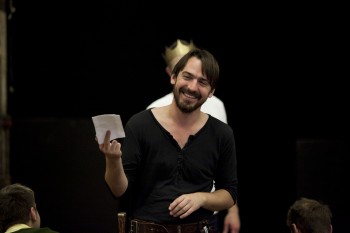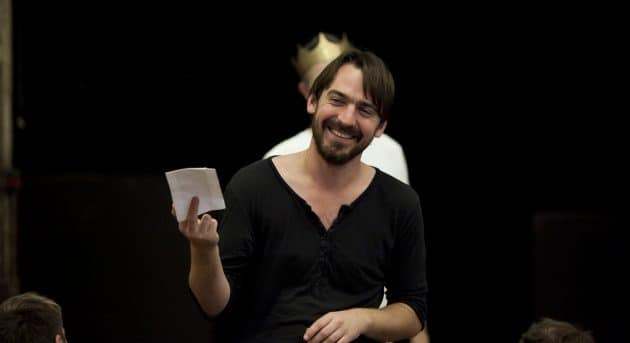Ewen Leslie – Playing ‘the Player’
Ben Neutze sat down with Ewen Leslie in a break during rehearsals to talk about his role in Rosencrantz and Guildenstern Are Dead, his skyrocketing career and being reunited with old friends Toby Schmitz and Tim Minchin

Photo: Lisa Tomasetti
As Ewen Leslie sits in the middle of the Bar at the End of the Wharf, at a table hit by warm winter sun, he looks almost startlingly relaxed. Startling because he’s reaching the pointy end of rehearsals for Sydney Theatre Company’s Rosencrantz and Guildenstern Are Dead, one of the most anticipated events on Sydney’s theatre calendar this year. It’s the type of show that comes with certain expectations, and Leslie’s role, ‘the Player’, is one of Tom Stoppard’s most intriguing and difficult creations. But as Leslie eats his lunch and chats about the intricacies of Stoppard, it’s clear this show comes as a bit of a relief.
“In the last seven years, since I started getting work, the closest thing I’ve done to a comedy was Richard III and that ended with me butchering children and bawling my eyes out every night,” he says. “I’ve played a lot of tortured young men.”
Out of character, Leslie has none of the intensity that typifies his performances, but all of the intelligence you’d expect. As he gazes out over the water surrounding the bar and comments that Sydney Theatre Company must have the most beautiful location of any theatre company in the world, he seems perfectly at home.
At 33, Ewen Leslie is one of Australia’s most sought after stage actors. He started to gain serious recognition when he starred in the 2005 AFI Award winning film Jewboy and since then he’s built his profile and skills performing with Sydney Theatre Company, Melbourne Theatre Company and Belvoir.
He won his first Helpmann Award in 2009 for his performance in STC’s epic The War of the Roses. The following year, he played Richard III for MTC and won yet another Helpmann. Of that performance, Alison Croggon said in the Australian, “His Richard will be talked about for years: it marks the ascension of a remarkable actor. Absolutely not to be missed.”
In 2011, Leslie played the titular role in Hamlet, the play that has Ros and Guil as its subversive spin-off. He was drawn to this production of Ros and Guil because he’d worked with director Simon Phillips on both Richard III and Hamlet and was keen to collaborate again. It also gave him the opportunity to work with old friends Toby Schmitz (with whom he shared an apartment for five years) and Tim Minchin (who slept on their floor for a few months) in a role where he won’t have to be in the spotlight quite as much as he’s used to.
“There’s a lot of pressure on Tim and Toby in this production,” he says. “It’s nice to be playing a supporting role where you don’t have that much stress and can just have fun.”
The winning combination of Leslie, Minchin and Schmitz has now nearly sold out the original month-long run at the 900-seat Sydney Theatre and an extra week of performances was recently added. But in 2004, before their stars had all conclusively risen, the story wasn’t quite the same.
The three were working together on This Blasted Earth – A Christmas Miracle at Sydney’s Old Fitz Theatre and were struggling to sell out the 60-seat theatre. “Toby convinced Tim to come over from Perth to do the music and we only made about $50 or so,” Leslie recalls.
Over the following years the three followed different career paths, but all three ended up playing Hamlet at some point. It means that they’re not just reuniting with years of onstage experience, but also with intricate knowledge of the base material. However even that couldn’t prepare Leslie for how challenging and rewarding working on this production would be.
“There are so many jokes in there and some are so obscure,” he says. “There are some in there that I didn’t get and I’ve played the role. But you don’t need to know the plot of Hamlet back to front to get so much of it. One moment there’ll be a highly intricate, intellectual gag and the next there’s a joke about someone picking their nose, or a pirate attack.”
In spite of all the silliness, Leslie says Stoppard requires a kind of precision that makes it more difficult than most dramas. “The blocking of these scenes has to be so specific – if one person moves where they’re not meant to or one person turns their head when we need everyone to be still, it kind of ruins the gag.”
As ‘the Player’ Leslie is only on stage for about 40 minutes of the show, but his character articulates some of the themes of the play more clearly than any other character.
“In a weird way, he does know what’s going on, but in another way he has no idea, but his outlook is that it’s okay. He says ‘uncertainty is the normal state’. That’s the fun of him – where Ros and Guil pull apart their situation, try to intellectualise it and work it all out, he just says ‘relax, respond.’ He has a wonderful outlook on life I suppose.”
Leslie is in the unusual position of having no big roles locked in after Ros and Guil. After being in consistent work for the past several years, he is taking a little time away from the stage to try his hand at Hollywood. He starred in the film Dead Europe last year and travelled with the film to the Toronto Film Festival where he attracted the attention of an LA-based agent.
“I’ve always had a bit of an aversion to the whole LA thing,” Leslie says, “But I was there for three weeks last year and it was good to take the mystery out of it. So I’ll go do that, see what happens and surely become a millionaire. What could possibly go wrong?”
For now, Leslie is focused on his first love, theatre, and he’s relishing the opportunity to take on ‘the Player’ in all his theatricality. “One of my favourite lines is, ‘Everything has to be taken on trust; truth is only that which is taken to be true. It’s the currency of living. There may be nothing behind it, but it doesn’t make any difference so long as it is honored.’”
“That’s a perfect summation of theatre; every time you go to see a show, whether it’s a play or a musical, you know it’s not true and you know it’s all fake, but as an audience member you have to honour it and you have to take it as some sort of truth or else you’re not going to get anything out of it. That’s the sort of contract that happens between the actors and the audience.”
Rosencrantz and Guildenstern Are Dead is playing at Sydney Theatre from August 6 – September 14. For more information, visit www.sydneytheatre.com.au

